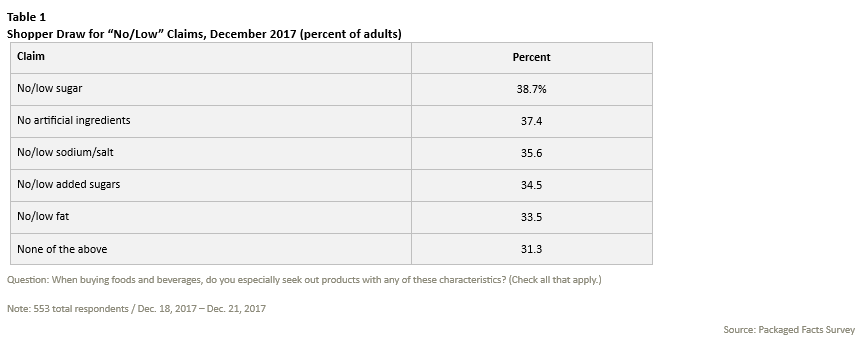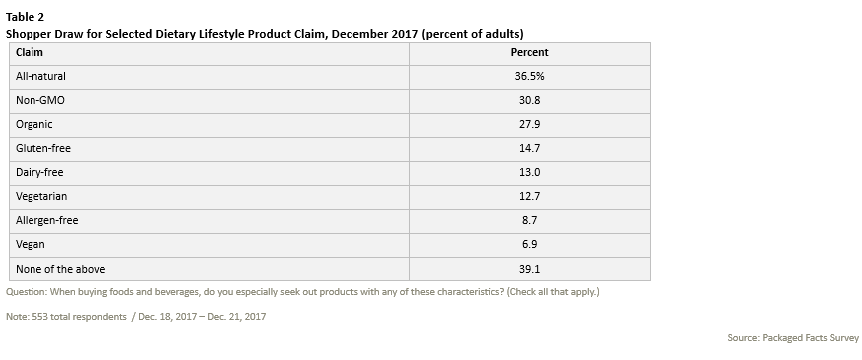The Importance of Health-Related Product Claims and Positioning
by Sarah Schmidt
January 2, 2019
Health and wellness trends have significant impact on consumer attitudes and behaviors when shopping for food and beverages. The dilemma is that health is a subjective term. This means there is a range of desired product attributes that consumers seek out to fit within their perspective of what’s healthy, according to Packaged Facts in the report Breakfast: Retail Product Trends and Opportunities in the U.S., 2nd Edition.
More Consumers are Avoiding Sugar
While low calorie and low carb were at one time benchmarks for health food, attention has shifted to a greater focus on low/no sugar or low/no added sugars. Sugar is an ingredient in many packaged breakfast foods, especially cereal and breakfast pastries. [Table 1]

All-Natural, Non-GMO Among Most Sought Out Health Claims
Health trends are moving away from being diet-focused in favor of adopting a healthy lifestyle. With increased knowledge of food sourcing and manufacturing practices, there’s an increased focus on foods that are fresh, naturally produced, and locally sourced foods.
Indeed, with almost 37% participation among all adults, “all-natural” is the most sought out dietary lifestyle characteristic when buying food and beverages, followed by non-GMO (31%), and organic (28%). Increasingly, many Americans are subscribing to a dietary lifestyle that eliminates gluten, dairy, allergens, and vegetarian/vegan as a way to approach health. Ultimately, these characteristics suggest an overall “healthy” approach to one’s diet. [Table 2]

Healthy Breakfast Food at Retail
Utilizing Buzzwords that Build Trust
Breakfast products are a segment where marketers are making some of the most obvious strides to cater to demands for healthier food options. Industry players are doing their part in addressing health trends through new product development of better-for-you breakfast. Buzzwords that fit under the better-for-you umbrella are “organic,” “natural,” “wholegrain,” and “non-GMO” among others.
Annie’s Homegrown is a good example of a player expanding its brand into the better-for-you breakfast space with its new line of cereals: Organic Berry Bunnies, Organic Cocoa Bunnies, and Organic Frosted Oat Flakes. The line hits many consumer health preferences, such as organic, wholegrain, gluten-free, and no artificial flavors, synthetic colors, preservatives, or high fructose corn syrup.
Fixating on “Free From” Claims
“Free from” claims are also an important way marketers are addressing specific health interests in the breakfast segment. Diet trends and select health lifestyle choices encourage consumers to seek out products that eliminate corn, nut, dairy, and gluten. Further, vegan claims have gained traction in an attempt to capture part of the health halo and lifestyle preferences.
In another example, Amy’s Kitchen caters to consumers interested in a plant-based diet or those seeking out specific foods to adhere to their special dietary needs. The company offers a Breakfast Scramble described as being: “Gluten free/dairy free/lactose free/corn free/tree nut free/vegan/kosher.”
Catering to Busy Americans with Healthy Breakfast “Snacks”
Lastly, food marketers recognize that harried mornings are a hallmark of an American lifestyle. To that end, on-the-go breakfast options are in demand. Combining portability and health into a breakfast product is an important trend.
Nature’s Path, for example, launched a line of Sunrise Breakfast Biscuits to cater to the on-the-go breakfast consumer: Blueberry & Chia Breakfast Biscuits, Touch of Honey & Chia Breakfast Biscuits, and Dark Chocolate & Coconut Breakfast Biscuits. The line addresses consumer health interests in organic, non-GMO, and whole grains—and while it is positioned as a breakfast option, it clearly crosses into the snack realm.
Have unique research needs?
Freedonia Custom Research listens intently to your needs and objectives. Then we work diligently to define and deliver a service to meet them.Subscribe to Our Blog
Stay up to date with the latest information about new market research and news in areas relevant to your business from our analysts and team members.Packaged Facts Blog Subscription
Provide the following details to subscribe.